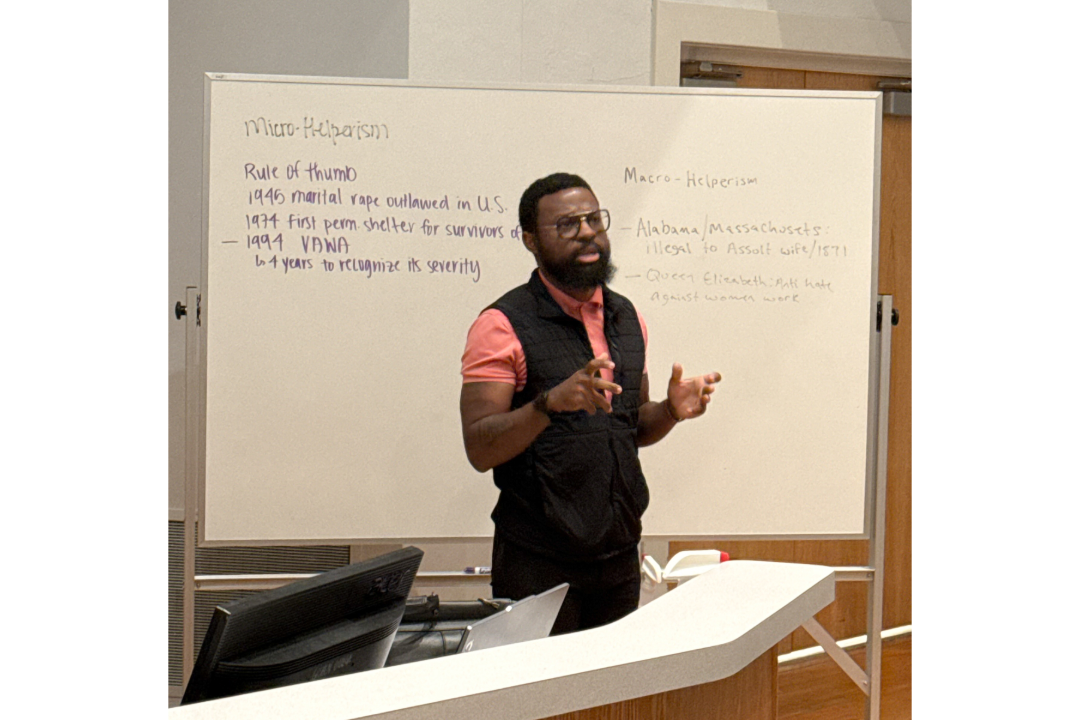Dr. Steven D. Parker, an esteemed social worker, psychotherapist and abolitionist, visited Goshen College on Monday, Oct. 27. Throughout the day, Parker worked with the Prevention Intervention Network and the Black Student Union. In the evening, he held a presentation on the topic of domestic and dating violence.
Several night classes attended the presentation, as well as other students and faculty. Parker said he encouraged the crowd to be both attentive and inquisitive. He began with a breathing exercise and an acknowledgment of the land, labor and life of indigenous groups that inhabited this area prior to settlers. Afterward, he took a variety of questions ranging from trivial but humanizing queries of his middle name and Kenyan bracelet to the choice of imagery of a female-presenting nurse on his slide show.Once the attendees were well-acquainted, Parker began the main content of his presentation, which he broke down into four sections: historical foundation, definitions, and the micro and macro “helperisms,” a term Parker used to describe an entity’s role in domestic and dating violence.
The first part, historical foundation, used a variety of important events to explain how societal attitudes towards domestic violence have changed over the years. The history, or “her-story” as Parker liked to call it, juxtaposed the older laws that actively hurt women’s rights with the increasing resources for women in the latter half of the twentieth century. This culminated in the Violence Against Women Act of 1994.
This section of the presentation was a highlight for Patty Hartshorn, Goshen College’s director of Health and Wellness and Title IX Coordinator, a longtime friend and former colleague of Parker. She explained how his work as a critical race theorist allows Parker to bring a fresh perspective to difficult topics such as these.
“You’re going to come away with information that you did not have before,” Hartshorn said. “It’s always in the idea of building up and encouraging individuals to have access to information and resources.”
Parker then moved on to the definitions and differences between domestic and dating violence. He explained that domestic violence is the term typically used in law, and covers a broader range of relationships, such as roommates, friends, family members, or romantic partners. Dating violence is more specific.
“Typically, when we talk about dating violence, people have to be in a relationship that is a sense of romanticism,” Parker said. He added that it is the term more commonly used in spaces of higher education.
Due to time constraints, Parker was only able to touch briefly on the “helperisms.” At the micro level, he brought out three important ways someone can cause change on the subject of domestic or dating violence: knowledge, skill, and attitude. The macro level is about institutional change, which is often easier to see the effects of, but Parker made sure to stress the importance of the work at both the macro and micro levels.
Ellie Nickel, a fourth-year social work major and PIN member who had already met with Parker that morning, explained that she was inspired by Parker’s message and wanted to learn more from him by attending the presentation in the evening. Afterward, she felt encouraged to increase her own skillset and work towards being an abolitionist of domestic and dating violence.
“Every person has inherent value,” Nickel said. “How are we demonstrating that? How are we treating others? How are we spreading that sort of understanding and having each other see that value and see that every person is worth respecting?”
“We have to engage in research,” Parker said. “We have to engage in activism. We have to engage in these things and keep our voices as loud as they can be.”
For the students, Parker gave many words of encouragement to continue learning, asking questions, speaking out, and engaging in both interpersonal and intrapersonal dialogue.
“Stuff happens in the world,” he said. “Begin to contemplate and think about it.”


